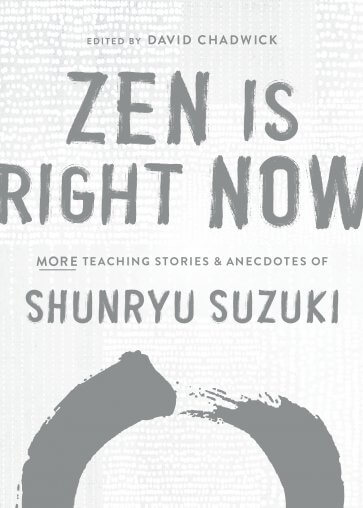Zen is Right Now: More Teaching Stories and Anecdotes of Shunryu Suzuki
Book Review
This collection of short stories about the life and teachings Shunryu Suzuki has a the feel of a modern day writings of the Zen Masters - reviewed by Michael O'Neill.

Book cover of Zen Is Right Now
by Shambhala https://www.shambhala.com/media/catalog/product/optimized/b/e/be3bfddc9aaab03f1bb8d79ef398ccce/9781611809145.jpg
Shunryu Suzuki’s “Zen Mind, Beginner’s Mind” is one of the all-time best-selling books on Zen in the West and has done an enormous amount to popularise Zen. So well-known is it, that it can be referred to simply as ZMBM. A book of his talks on Sekito Kisen’s Sandokai (Branching Streams Flow in the Darkness), compiled and published in 1999, revealed a deep scholarship and a subtle interpreter of classic texts which Suzuki chose not to reveal in ZMBM. While it lacks the immediate accessibility of ZMBM, this book deserves to be more widely read in order to arrive att a more rounded picture of the master and his teachings. Apart from a number of other memoirs and collections, we do not have an extensive body of work by, or about, Suzuki and there is undoubtedly a hunger for more of his teachings.
David Chadwick was a long-time student of Suzuki as well as his authoritative but affectionate biographer. In Zen is Right Now, he has collected various anecdotes and memories of Suzuki either from his own memories of those of fellow students. Given that Suzuki died in 1971, the direct memories of those who studied with him will be beginning to fade and it is timely that Chadwick should collect these moments into a compendium. The stories are not attributed or dated which gives them a timeless quality. The playful side of Suzuki comes across strongly in the vivid snapshots.
The collection has a feel of a modern day Mumonkan, with each contribution revealing an episode which, however brief, obviously had tremendous resonance for those involved. If the vignette nature of the stories gives the book the appearance of something that can be dipped into, the content does anything but. We are continually reminded of the effort, dedication and commitment that Suzuki showed in his practice and demanded of his students. Chadwick describes in Crooked Cucumber how Suzuki was initially dismayed at how lax the practice of even the Japanese American community he had come to serve had become. He also notes how much Suzuki enjoyed American life and was heard to say “If I had known it was going to be like this, I would have come sooner.” Nonetheless, he set about instilling what he thought was the true Zen spirit and he did so by example, embodying the steady heart of the committed man of the way.
There are 126 vignettes and any one of them would serve as an excellent example of Suzuki’s teachings. I am sure that everyone will find their own. But today in re-reading to book, three resounded with me.
P6. A student said that they had disturbing images and thoughts during zazen. Suzuki said “Whatever bird flies through the sky, the sky doesn’t care.’’
P 12. Suzuki said he was most happy when his students shared in the joy of practice. He said that this is what Buddhism is – not enlightenment or understanding.
P 35. In zazen, leave your front door and your back door open. Let thoughts come and go. Just don’t serve them tea.
I wish you well in reading this book and finding your own favourite moments.
Chadwick, David (1999). Crooked Cucumber: the Life and Zen Teaching of Shunryu Suzuki (1st ed.). New York: Broadway Books. ISBN 0-7679-0104-5.
Suzuki, Shunryu (1999). Weitsman, Mel; Wenger, Michael (eds.). Branching Streams Flow in the Darkness: Zen Talks on the Sandokai (1st ed.). University of California Press. ISBN 0-520-21982-1.




